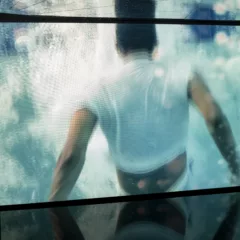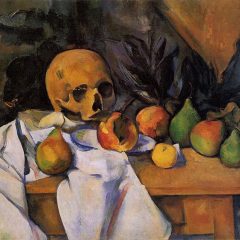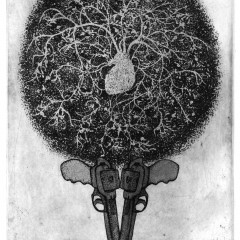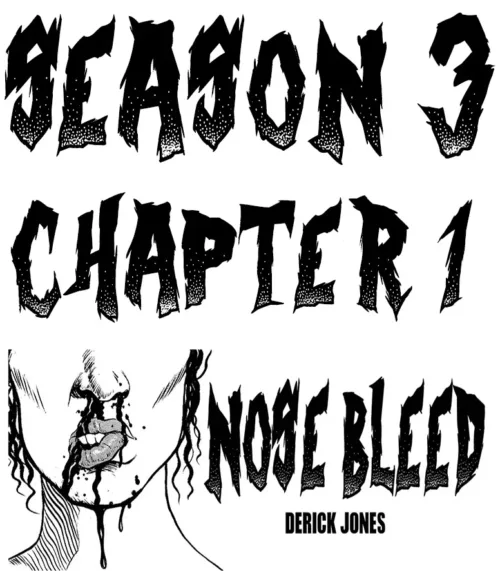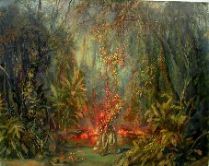
heffernan, julie
I’ve been meaning to write about my talk with Amy Lipton, the new full-time curator at Abington Art Center. I met her a couple weeks ago when she walked me through her first indoor exhibit at the Center,”Trouble in Paradise.” It’s a show she originated at Van Brunt Gallery in New York (in May, 2004) and has brought with her to Abington — with a few changes. (top image is Julie Heffernan‘s “Study for Self Portrait as Hostile Takeover,” oil on canvas, 2004, and below is a detail of that detail-rich and Mardi-Gras bead heavy work, one reason to go see “Trouble.”)
I’ll have more on the show in another post. And Libby will weigh in also.
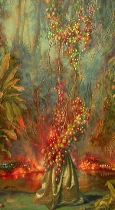
Anyway, Lipton is a Main Line girl who went to art school at California Institute of the Arts (BFA, 1980, she studied painting, drawing, printmaking). After graduation, she said, “I moved to New York and got a studio and within a year I knew a career as a studio artist was not for me. The New York scene is a killer.” Instead, Lipton did something she knew she’d be good at — she became a curator and gallery owner in the then cheap-rent East Village. Her Amy Lipton Gallery (which moved to Soho after a while) was up and running from the mid-80s to mid-90s. She was the first to show then-emerging artists Polly Apfelbaum, Sue Williams, Karen Finley and Mel Chin. Her successful show with Mel Chin went straight to the Hirshhorn, she said.
Working with Chin early in her career was instrumental in focusing her on ecology and on artists whose work deals with earth-related concerns. Since 1995, Lipton has been an independent curator whose writings and exhibitions have dealt with that subject, something Abington is increasingly interested in as well.
AAC, which includes an historically-important building, Alverthorpe, has 20+ acres of land including a manicured lawn cum sculpture park that houses works by Alan Greenberg, Ursula von Rydingsvard, Steven Donegan, Jeanne Jaffe, Sheila Klein, Mara Adamitz Scrup, Ron Klein, Tom Bills, Nick Kripal and Rebecca Johnson.
greenberg, alan
(below right is Greenberg‘s “Up House Down” in the sculpture garden)
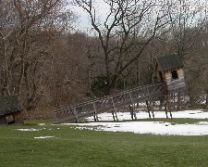
The extensive and heretofore unaltered woods (with watershed) houses Winifred Lutz‘s “Reclamation Garden” and a Quaker Meeting House dating from 1836 that was abandoned in 1970 when the meeting moved elsewhere.
Abington recently got money from the state of Pennsylvania ($500,000) and from the Institute of Museum and Library Services ($64,410) to work on a master landscaping plan and visitors’ interpretive center. Both grants require local matching funds.
Lipton’s charge is to bring art to the great outdoors. The indoor program, she said, will expand on the outdoor program, giving the featured artists a chance to show works in the gallery. Right now, Lipton told me she is talking with Winifred Lutz about re-envisioning the Reclamation Garden.
Lipton debuts her first hands-on, Abington outdoor exhibit on June 5. The show will be temporary works, up for about a year, some in the sculpture park and some, she hopes, in the woods. In the future, there will be permanent or long-term projects installed. Also debuting that same date will be a piece by J. Morgan Puett in the abandoned Quaker meetinghouse. “Lost Meeting,” curated by Julie Courtney, is a PEI-funded project.
donegan, steven
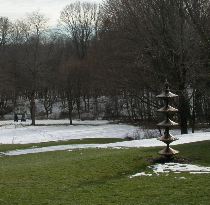
(left is Donegan‘s sculpture garden piece, “Conductor”)
Lipton, whom I found charming, articulate, and serious but possessed of a nice sense of humor, is commuting to Abington several days a week from her home in the Beacon, NY area. She is house-hunting and will be moving to Philadelphia with husband and daughter soon.


